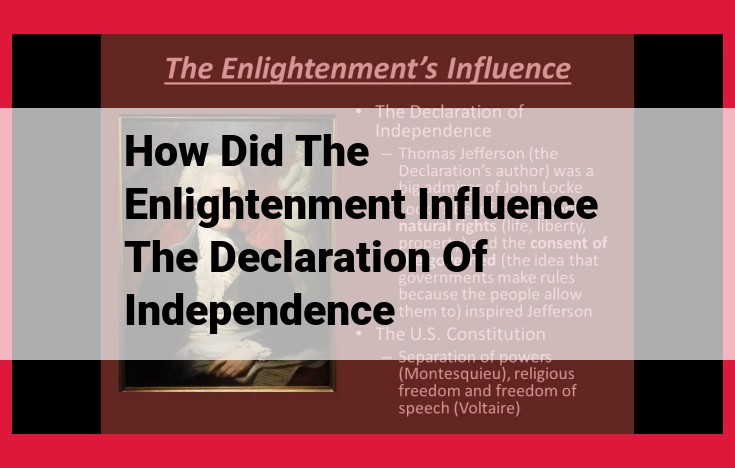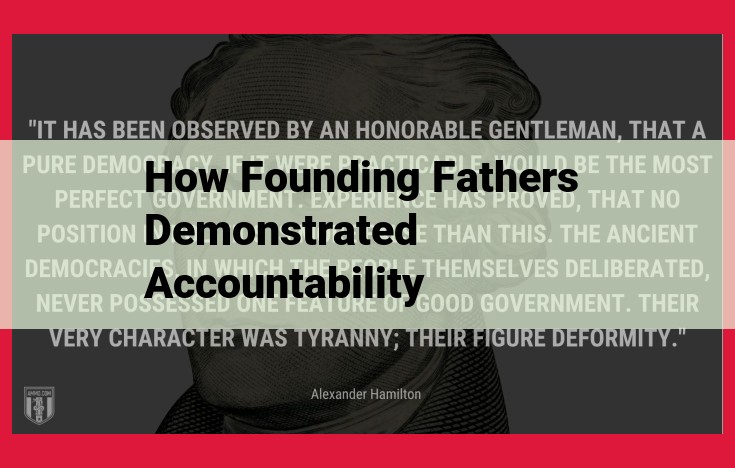The Enlightenment, an era of intellectual revolution, profoundly shaped the Declaration of Independence. Enlightenment principles such as reason, individualism, and natural rights, advocated by thinkers like Locke and Rousseau, provided the ideological foundation for the document. These principles legitimized the colonists’ opposition to British rule, fostering beliefs in self-governance, individual rights, and the consent of the governed. The Declaration’s assertion of “unalienable Rights” and the right to “alter or abolish” oppressive governments mirrored Enlightenment ideals, demonstrating the profound influence of this intellectual movement on the birth of American independence.
The Enlightenment: A Revolutionary Era of Intellectual Awakening
During the 18th century, Europe experienced an intellectual revolution that profoundly shaped the course of history. This era of enlightenment was characterized by a profusion of philosophical ideas, a rejection of traditional dogma, and an unwavering faith in human reason.
The Enlightenment was sparked by a disillusionment with the religious wars and political turmoil that had plagued Europe for centuries. Intellectuals sought refuge in reason and science as a means to forge a new society based not on blind faith but on empirical observation and rational thought.
Key characteristics of the Enlightenment included:
-
Emphasis on reason: The Enlightenment thinkers believed that human reason could unlock the mysteries of the universe and guide social progress. They championed scientific inquiry and sought to replace superstition with knowledge.
-
Rejection of tradition: The Enlightenment challenged traditional authority, whether religious or political. Thinkers argued for the separation of church and state and for the rights of the individual against the encroachment of the state.
-
Belief in progress: The Enlightenment thinkers were optimistic about the future. They believed that through reason and education, humanity could progress indefinitely. This belief in progress laid the foundation for the modern idea of a perfectible society.
Philosophers and Thinkers: Influential Minds of the Enlightenment
Unlocking the Enlightenment with Locke, Voltaire, and Rousseau
The Enlightenment, an era of profound intellectual awakening, sparked a revolution in thought and society. It was a time where philosophers and thinkers challenged traditional doctrines, advocating for reason, individualism, and natural rights. Among the most influential minds of this transformative period were John Locke, Voltaire, and Jean-Jacques Rousseau.
John Locke: The Father of Liberalism
Locke, an English philosopher, is considered a pioneer of modern liberalism. He rejected the divine right of kings, arguing that all humans are born with inherent rights, including the rights to life, liberty, and property. His ideas laid the foundation for the social contract theory, which emphasized the importance of consent in government.
Voltaire: The Champion of Free Expression
Voltaire, a French philosopher and writer, was a fierce advocate for freedom of thought and speech. He famously said, “I disapprove of what you say, but I will defend to the death your right to say it.” Voltaire’s wit and incisive critiques challenged religious superstition and authoritarian rule, inspiring generations of thinkers.
Jean-Jacques Rousseau: The Advocate for General Will
Rousseau, a Swiss philosopher, rejected the social inequalities of his time. He argued that society should be based on the general will, or the collective interests of the people. Rousseau’s ideas of democratic government and the social contract influenced the French Revolution and beyond.
Locke, Voltaire, and Rousseau were just a few of the many brilliant minds who shaped the Enlightenment. Their ideas and contributions challenged the old order, paving the way for the establishment of modern democratic societies. Their belief in reason, individualism, and natural rights continues to resonate with us today, inspiring us to strive for a more just and equitable world.
Principles of the Enlightenment: The Bedrock of Modern Thought
The Enlightenment, a transformative intellectual movement of the 18th century, left an enduring legacy on the fabric of modern thought. Its revolutionary tenets shaped the foundations of Western civilization, driving progress in science, philosophy, and governance.
Reason and Rationalism
The Enlightenment exalted reason as the supreme arbiter of knowledge and truth. Philosophers like John Locke and René Descartes argued that rational thinking could dispel superstition and reveal the natural order of the world. They believed in the power of observation, experimentation, and logical deduction to unravel the mysteries of the universe.
Individualism and Rights
Central to Enlightenment thought was the concept of individualism. Thinkers like Voltaire emphasized the inherent value of each person and their rights to liberty, property, and the pursuit of happiness. This philosophy challenged the prevailing feudal order and paved the way for democratic societies.
Natural Rights and Limited Government
The Enlightenment thinkers asserted the existence of natural rights, such as life, liberty, and the right to property. They argued that governments should be based on the consent of the governed and limited in their powers to protect these rights. The Declaration of Independence and the Bill of Rights, inspired by Enlightenment principles, enshrined these concepts in American law.
These core principles of the Enlightenment continue to resonate today, shaping our understanding of society, governance, and the search for knowledge. They laid the groundwork for the scientific revolution, the rise of liberalism, and the establishment of modern democracies. By embracing reason, individualism, and natural rights, the Enlightenment empowered humanity to challenge dogmas, pursue progress, and forge a more just and enlightened world.
Documents and Declarations: Seeds of Revolution
In the annals of history, the era of the Enlightenment, with its emphasis on reason and individualism, ignited a blaze of change. Emanating from this intellectual inferno were documents and declarations that would shape the course of human civilization forever.
Among these transformative texts, the Declaration of Independence stands as a beacon of liberty and self-determination. Its resounding words proclaim that “all men are created equal” and endowed with “unalienable rights” to “life, liberty, and the pursuit of happiness.” This declaration kindled a revolutionary spark that ignited a new nation, the United States of America.
Another seminal document, the Bill of Rights, etched into law the principles that define American democracy. Its ten amendments safeguard the fundamental freedoms of speech, religion, and assembly, ensuring the protection of individual rights and the balance of power between government and citizens.
Together, these documents sowed the seeds of revolution, not only in the American colonies but also across the globe. They became blueprints for constitutions and declarations of rights, inspiring uprisings and social movements worldwide. They ignited a flame that continues to burn brightly, a testament to the enduring power of the Enlightenment’s ideals.
Founding Fathers: Architects of a New World
The Enlightenment era laid the intellectual foundation for a new world order. Its principles of reason, individualism, and natural rights sparked a revolutionary spirit that would forever alter the course of history.
In the fledgling United States of America, the Founding Fathers became the embodiment of Enlightenment ideals. Inspired by the writings of Locke, Voltaire, and Rousseau, they sought to create a nation where individual liberty, equality, and self-governance reigned supreme.
The United States Constitution, the cornerstone of American society, bears the unmistakable imprint of Enlightenment thought. Its emphasis on limited government, separation of powers, and the protection of individual rights reflects the belief in the inherent goodness and rationality of humankind.
These Enlightenment principles also shaped the Declaration of Independence, a bold proclamation that asserted the right of a people to govern themselves. Its ringing words, “We hold these truths to be self-evident, that all men are created equal, that they are endowed by their Creator with certain unalienable Rights, that among these are Life, Liberty and the pursuit of Happiness,” became a rallying cry for a new era of freedom and equality.
Through the wisdom and foresight of the Founding Fathers, the Enlightenment’s transformative ideas found practical expression in the foundation of America. The principles they enshrined have stood the test of time, inspiring generations of Americans and leaving an enduring legacy on the global stage.




